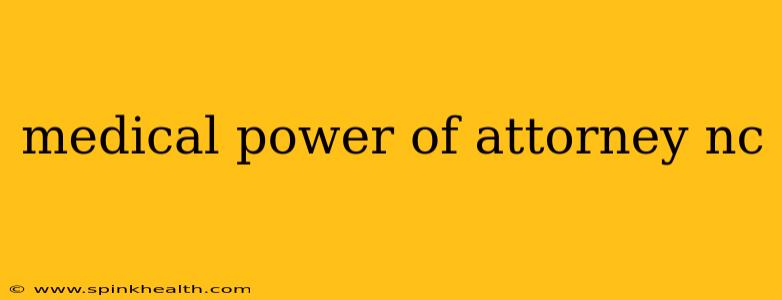Navigating the NC Medical Power of Attorney: A Guide to Protecting Your Healthcare Choices
Making crucial healthcare decisions can be daunting, especially when facing unforeseen circumstances. A North Carolina Medical Power of Attorney (MPOA) is a vital document that empowers you to appoint someone you trust to make these decisions on your behalf if you become incapacitated. This isn't just a legal formality; it's a powerful tool for ensuring your wishes are respected and your well-being is protected. Let's explore what an NC MPOA entails and answer some frequently asked questions.
What is a North Carolina Medical Power of Attorney?
Imagine a scenario: you're involved in an accident and are unable to communicate your medical preferences. Without an MPOA, the decision-making process falls to the next of kin, potentially leading to choices that don't align with your values. A North Carolina Medical Power of Attorney solves this. It's a legal document where you, the principal, designate an agent (your healthcare proxy) to make healthcare decisions for you when you lack the capacity to do so yourself. This includes decisions about life-sustaining treatment, medical procedures, and end-of-life care.
What does the agent do under a North Carolina Medical Power of Attorney?
Your designated agent acts as your voice when you cannot speak for yourself. They'll review your medical records, consult with physicians, and make decisions based on your previously expressed wishes, as outlined in your MPOA, and your best interests. This empowers your chosen agent to advocate for your healthcare needs with the authority granted through the legal document.
What information should be included in my North Carolina Medical Power of Attorney?
A well-crafted NC MPOA goes beyond simply naming your agent. It should:
- Clearly identify the principal and agent: Full names and contact information are crucial.
- Define the agent's authority: Specify the extent of your agent's decision-making power. Consider if you want them to make all healthcare decisions or only specific ones.
- Include your healthcare wishes: Detail your preferences regarding life-sustaining treatment, organ donation, and end-of-life care. This is often where people express their wishes regarding things like DNR (Do Not Resuscitate) orders.
- State the duration of the power of attorney: Will it last until your death, or only for a specific period or until you regain capacity?
- Designate a successor agent: If your primary agent is unable or unwilling to serve, naming a successor ensures continuity.
How does a North Carolina Medical Power of Attorney differ from a Durable Power of Attorney?
While both grant someone authority to act on your behalf, they differ significantly in scope. A Durable Power of Attorney covers financial and legal matters, while the MPOA focuses exclusively on healthcare decisions. It's advisable to have both, especially since your healthcare decisions can have financial implications.
Can I revoke my North Carolina Medical Power of Attorney?
Yes, absolutely. You have the right to revoke your MPOA at any time, as long as you have the capacity to do so. A simple, written revocation will nullify the document. It's recommended to inform your agent and keep a copy of the revocation for your records.
Do I need a lawyer to create a North Carolina Medical Power of Attorney?
While not strictly required, consulting an attorney is highly recommended. A lawyer can ensure your document is legally sound, accurately reflects your wishes, and complies with North Carolina law. They can also help you navigate complex medical and legal considerations to protect your best interests.
What happens if I don't have a North Carolina Medical Power of Attorney?
Without an MPOA, decisions about your healthcare will fall to your next of kin, as dictated by North Carolina law. However, this may not reflect your preferences or wishes and can lead to legal disputes among family members, creating significant stress during a difficult time.
Conclusion:
A North Carolina Medical Power of Attorney isn't just a piece of paper; it's a proactive step towards ensuring your healthcare wishes are honored and your loved ones are relieved of the burden of making difficult decisions when you're unable. Take the time to prepare this critical document and consult with a legal professional to guarantee your peace of mind and protect your healthcare autonomy. Your future self will thank you for it.

